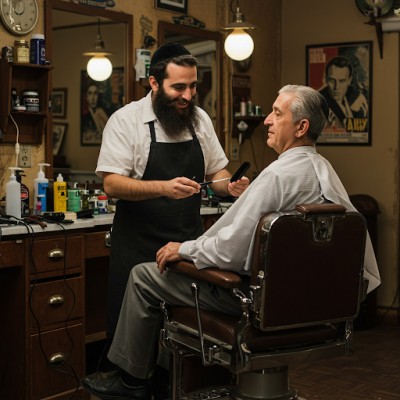


Question: In a location where the majority of the population is non-Jewish, must a barber exercise caution when shaving customers to avoid inadvertently violating the prohibition against rounding the corners of the head and shaving a Jewish person with a razor? Or can the barber assume that the majority of customers are non-Jewish and therefore not be bound by these restrictions?
Answer:
I. Majority
The Torah (Shemot 23:2) instructs us to "follow the majority" (acharei rabim l'hatot). This verse teaches that a Jewish court can rely on the majority view of its judges when rendering a decision, and a unanimous verdict is not required. Building on the principle of following the majority, the Talmud establishes the principle of "kol d'Parish m'Rubah parish." This principle states that in cases of uncertain origin, an item is presumed to originate from the majority source.1 To illustrate, if someone finds an unmarked item and there are multiple manufacturers of similar items, halachically, we assume its origin is from the most probable source, namely, the majority.
This principle allows us to proceed under the assumption that a person is not Jewish, unless there is sufficient evidence to indicate that they are Jewish.2
II. Must You Check
There are three levels of obligation to investigate whether a customer is Jewish before providing a shave with a razor or a non-kosher haircut:
- Muchzak (prevalent): If the area has a Jewish population of over 50%, one is obligated by Torah law (Deoraita) to investigate before serving each customer. Failure to do so would be a Torah prohibition.
- Mi'ut Ha'Matzuy (a statistically significant minority): If there is a significant minority of Jews in the area, there is a rabbinic obligation (Miderabbanan) to investigate before serving each customer.
- Mi'ut Sheino Ha'Matzuy (insignificant minority): If Jews are extremely uncommon in the area, no thorough investigation is halachically required.
Moreover, it is not necessary to investigate the situation further by asking for details when there is an additional doubt. As the Rashba (Torat HaBayit 35a) explicitly states, one can rely on a compound doubt without inquiring into the specifics. This is because, according to the Rashba, a compound doubt operates based on the principle of ‘majority', rendering further investigation unnecessary. Therefore, just as we rely on the majority and do not need to investigate, so too in a case of double doubt, we rely on the majority and do not need to investigate. This is also the opinion of Rashi (Chulin 11a) and Tosafot (Beitza 16b).
But what constitutes a significant minority (Mi'ut Ha'Matzuy)?
Different poskim offer varying thresholds:
- Rav Ya’akov of Karlin, (died 1855) in Mishkenot Ya'akov (Y.D 17) sets the bar (based on the Ran) at 10%. If the Jewish population in a given area exceeds 10%, one must probe further.
- Rabbi Yitzchak ben Sheshet (1328–1408), known as the Rivash (Siman 191), however, adopts a more lenient approach, requiring a significant minority of close to 50%. Only if the Jewish population surpasses close to 50% must one investigate further.
Notably, prominent poskim, including Rav Ovadia Yosef, Rav Meir Mazuz, Rav Moshe Levi, and Hachmei Jerba, rule in accordance with the Rivash's more lenient approach (Sefer Hora'ah Berurah 84:56 and Biur Halacha Aruch). Rav Yitzchak Yosef4 seems to conclude that the halacha is like the Rivash as well. Rav S.Z Revach 5 also records that Rav Ovadia Yosef held in accordance with the Rivash, but one who is strict should not be more stricter than 10%. Thus, there is no obligation on the barber to investigate further if the customer is Jewish or not.
The Jewish population in the United States is estimated to be 2.4% of the total population. However in New York State it is 10.8%. According to the Mishkenot Ya'akov, who rules that an obligation to investigate arises when the Jewish population exceeds 10%, one would be required to investigate in this case. However, the Rivash takes a more lenient approach, and since the Jewish population in New York is significantly less than 50%, there is no obligation to investigate.
III. Accepting a Person's Claim of Jewish Status
When a customer voluntarily discloses their Jewish identity and requests a non-kosher haircut or razor shave, can their claim of being Jewish be relied upon? In general, if someone claims to be Jewish because their mother is Jewish, their statement is accepted at face value, and they are permitted to marry a Jewish person. This is based on the principle of chezkat kashrut, which assumes that people are trustworthy, and the majority of individuals who claim to be Jewish are indeed Jewish.
However, there is an exception to this rule. The Shulchan Aruch (Y.D 268:10) states that if someone was previously known to be a non-Jew and now claims to be Jewish, we require proof of their conversion before allowing them to marry a Jewish person. This stringency only applies to marriage; in all other aspects of Jewish life (such as wearing tefillin, participating in a minyan, etc.), the person's claim of Jewish status is accepted without requiring proof. According to Halacha, the same principle applies if someone claims to be Jewish due to conversion. Therefore, one should technically accept their claim at face value and refrain from providing non-kosher haircuts or razor shaves.
IV. Conclusion
In conclusion, the question of whether a barber must assume a customer’s Jewish status in a predominantly non-Jewish area hinges on the halachic principles of majority (rov) and the obligation to investigate. In areas where Jews constitute a small minority, there is no halachic obligation to investigate a customer’s Jewish status, and the barber may rely on the statistical majority to avoid violating prohibitions such as shaving with a razor. However, in regions with a significant Jewish population (over 10% or close to 50%, depending on the posek), the barber is required to exercise caution and investigate further. Additionally, when a customer voluntarily discloses their Jewish identity, their claim is generally accepted at face value.
By Rabbi Nissan Shalomayev
Rav, Bukharian Jewish Cong. of Hillcrest, Kehilat Ohr V'Achdut
The Barber Shop Conundrum: Should We Assume A Customer's Jewish Status?
Typography
- Smaller Small Medium Big Bigger
- Default Helvetica Segoe Georgia Times
- Reading Mode




